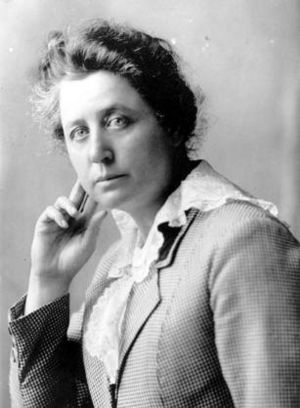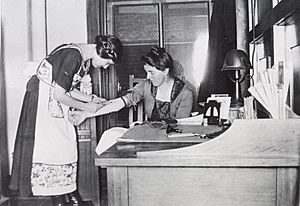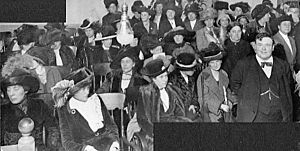Marie Equi facts for kids
Quick facts for kids
Marie Equi
|
|
|---|---|
 |
|
| Born |
Marie Diana Equi
April 7, 1872 |
| Died | July 13, 1952 (aged 80) Portland, Oregon, U.S.
|
| Occupation | Physician |
Marie Equi (April 7, 1872 – July 13, 1952) was an early American medical doctor in the American West devoted to providing care to working-class and poor patients. She became a political activist and advocated civic and economic reforms, including women's right to vote and an eight-hour workday. After being clubbed by a policeman in a 1913 workers' strike, Equi aligned herself with anarchists and the radical labor movement.
Equi was a lesbian who maintained a primary relationship with Harriet Frances Speckart (1883 - May 15, 1927) for more than a decade. The two women adopted an infant and raised the child in an early example, for the United States, of a same-sex alternative family. For her radical politics and same-sex relations, Equi battled discrimination and harassment. In 1918, Equi was convicted under the Sedition Act for speaking against U.S. involvement in World War I. She was sentenced to a three-year term at San Quentin State Prison. She was the only known lesbian and radical to be incarcerated at the prison.
Contents
Early years
Equi was the daughter of John Equi, an Italian immigrant, and Sarah Mullins, an Irish immigrant. She was born the fifth child and fifth daughter in a large working-class family in New Bedford, the former whaling capital of the world that became a textile manufacturing powerhouse during Equi's early years. She attended New Bedford High School for one year before dropping out to work in a textile mill to support herself. In 1892 Equi escaped a grim future in the mills and joined her high school girlfriend, Bessie Holcomb, on an Oregon homestead along the Columbia River.
Homesteading and medical study
Equi and Holcomb lived a quiet life as close companions in a small house on several rocky acres outside the small city of The Dalles. On July 21, 1893 a local newspaper, The Dalles Times-Mountaineer, reported the sensational ruckus earlier that day that drew crowds of merchants and shoppers to the center of town. Equi paced back and forth in front of the office of the Reverend Orson D. Taylor, a land developer and also the superintendent of the Wasco Independent Academy. Taylor had reneged on paying Holcomb her full salary for teaching at the institution. Frustrated over the mistreatment of her companion, Equi horsewhipped Taylor when he tried to escape from his office. Many people in The Dalles regarded Taylor a crook who pedaled fraudulent land deals, and they applauded Equi's assault. They later held a raffle for the whip and gave the proceeds to the two women. The event became the public's first exposure to Equi's bold defense of justice.
In 1897 the pair moved to San Francisco, California where Equi began studying medicine. She completed two years of coursework, first at the Physicians & Surgeons Medical College and then at the University of California Medical Department. She relocated to Portland, Oregon – without Bessie Holcomb – and completed her studies at the University of Oregon Medical Department in 1903.
In the aftermath of the 1906 San Francisco earthquake and fire, she joined a group of doctors and nurses to provide medical care to people stricken in the disaster, earning her a commendation from the United States Army.
Medical care and social activism
Marie Equi became one of the first 60 women to become a physician in Oregon. She established a general medicine practice in Portland in 1905 with an emphasis on health concerns of women and children. Her role as a physician became widely known to the public once she volunteered to join a group of doctors and nurses who provided medical care to people stricken during the 1906 San Francisco earthquake and fire. That disaster was the largest natural calamity with the most deaths for nearly one hundred years. At the time, the federal government was not prepared to provide the kind of massive relief needed. Equi's courageous volunteer work was hailed by California's Governor, San Francisco's Mayor, and the U.S. Army which awarded her a medal and a commendation.
During the Progressive Era, generally 1895 to 1920, Oregon adopted civic and political reforms that became a model for the nation, including the initiative and referendum process, recall of elected officials, and direct election of U.S. Senators. Equi worked in several campaigns to secure women's right to vote in Oregon, and celebrated victory in 1912 when women gained suffrage in the state.
Radical politics
In 1913 Equi visited the site of a strike by cannery workers in east Portland at the Oregon Packing Company. The workers, primarily women, protested poor working conditions, uncertain work hours, and a wage of only five to eight cents an hour. Once Socialists and members of the Industrial Workers of the World (IWW) joined the strike in support of the women, the struggle expanded to include the right to free speech. Equi joined the protest and became one of its leaders, partly due to her professional stature as a physician. After days of picketing, the police stormed the strikers. Equi was clubbed by an officer after she became enraged that a 30-year-old pregnant woman had been dragged away by the police. After several more days, the strike ended on terms unsatisfactory to the women workers. For Equi, the police brutality she witnessed had radicalized her, and she turned from her earlier advocacy of Progressive reforms.
Equi became an influential voice in Portland's unemployment crisis in 1913-1914. She regularly marched with jobless men, demanded better working conditions for them, and she engaged in the IWW's free speech fights and support for lumber workers in the region's forests. She declared herself a Radical Socialist and an anarchist, and she aligned herself with the IWW.
Opposition to World War I and punishment
During the increasingly contentious times leading to the U.S. entering World War I, Equi objected to the nation's war preparedness campaigns. She believed the war efforts represented a grab for profits by capitalists and an imperialistic adventure for the government. Massive preparedness parades were held in all major U.S. cities in 1915 and 1916. Portland entered a phase of hyper-nationalism, and Equi became more of a political outsider than before. She protested a pre-war campaign in downtown Portland and unfurled a banner reading "Prepare to die, workingmen, JP Morgan & Co. want preparedness for profit." She was attacked by others in the march, and a fight ensued, leading to her arrest.
Equi continued to protest once the US entered the war in 1917. The US government believed that Equi was a dangerous threat to national security and charged and convicted her of sedition under the newly revised Espionage Act. Equi attempted appeals to the higher courts, but her arguments were rejected. At the last minute before imprisonment, President Woodrow Wilson commuted her three-year sentence to one year and a day.
Equi served her time in San Quentin State Prison in northern California, beginning her term on October 19, 1920, as inmate number 34410. She was forty-eight years old. She shared the women's quarters with thirty-one other inmates. Equi was the only "political" among them.
Equi's health suffered while in prison with flare-ups of tuberculosis that she had contracted in childhood. She maintained her morale as best she could with the moral support from many visitors and letter writers. She sought early release through a pardon or parole, but it appeared that the US Attorney General repeatedly blocked any leniency for her. Equi left San Quentin on August 9, 1921, with a reduced sentence due to good behavior. She had served nearly ten months.
Later years
Americans tried to put the war years out of their mind in the 1920s, but they nevertheless were swept into a heightened fear of radicals, labor unionists, and communists that became known as the "Red Scare." Equi re-entered public life with her political comrades imprisoned or greatly restricted from protest activity. Equi returned to her medical practice.
For lengthy periods between 1926 and 1936 Equi invited the IWW leader Elizabeth Gurley Flynn to live with her and help care for Equi's daughter. Flynn suffered serious health problems, including exhaustion from overwork and depression from political setbacks. Equi, Flynn, and Equi's daughter lived at 1423 SW Hall in Portland's westside neighborhood—Gander Ridge of Goose Hollow at 1423 SW Hall. In 1930 Equi suffered a heart attack, sold her medical practice, and asked Flynn to assist her for several more years. Finally Flynn retreated to the East and resumed her work. She became a national leader of the Communist Party USA.
Equi led a quiet life following the departure of Flynn and then the elopement of her daughter. Radical and labor leaders continued to revere her for her courage and compassion during earlier decades; several visited her at her house.
In 1950 Equi fractured her hip in a fall and spent a year at Good Samaritan Hospital in Portland and then to a nursing home outside Portland near the town of Gresham. She died at Fairlawn Hospital on July 13, 1952 at 80 years of age. Her obituaries ran in newspapers across the country, including those in Portland, New Bedford, Massachusetts, and in the New York Times. Equi's activist friend Julia Ruuttila described her as "a woman of passion and conviction (and) a real friend of the have-nots of this world." She is buried alongside Harriet Speckart at Wilhelm's Portland Memorial, Portland, Multnomah County, Oregon.
In August 2019, Equi was one of the honorees inducted in the Rainbow Honor Walk, a walk of fame in San Francisco’s Castro neighborhood noting LGBTQ people who have "made significant contributions in their fields."
See also
 In Spanish: Marie Equi para niños
In Spanish: Marie Equi para niños



